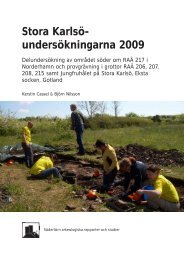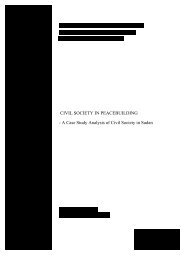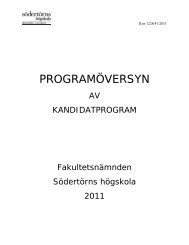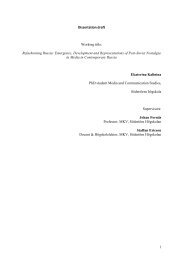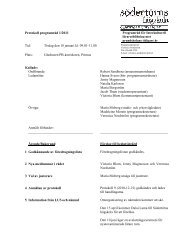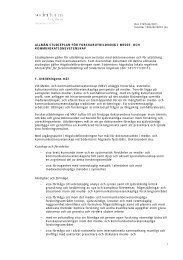Underlying Reasons for the Persistence of Female Genital Mutilation
Underlying Reasons for the Persistence of Female Genital Mutilation
Underlying Reasons for the Persistence of Female Genital Mutilation
You also want an ePaper? Increase the reach of your titles
YUMPU automatically turns print PDFs into web optimized ePapers that Google loves.
y implementing appropriate legislations 68 . The convention is against all traditional practices that<br />
are harmful to women and state parties should seek to change attitudes towards customs and<br />
practices that discriminate women. In addition article 5 (b) constitutes family roles, and<br />
emphasizes <strong>the</strong> importance <strong>of</strong> family education and parental responsibility towards <strong>the</strong> child 69 .<br />
Readdressing to <strong>the</strong> CRC state parties is obliged to develop and undertake all actions and polices<br />
in <strong>the</strong> best interest <strong>of</strong> <strong>the</strong> child. Regarding FGM, governments are responsible to end <strong>the</strong> practice<br />
in <strong>the</strong> interest <strong>of</strong> <strong>the</strong> child, through instruments implemented in educating about <strong>the</strong> dangers, and<br />
also giving responsibility to parents and legal guardians. However, referring to data stating that<br />
FGM is a social convention that is highly important <strong>for</strong> women’s status and social approval, <strong>the</strong><br />
outcome <strong>of</strong> intervening in <strong>the</strong> best interest <strong>of</strong> <strong>the</strong> child, may not always be <strong>the</strong> ultimate solution<br />
since not having undergone FGM can result in social exclusion in <strong>the</strong> community and <strong>the</strong> child<br />
may suffer emotionally. Also considering <strong>the</strong> parents having <strong>the</strong>ir best interest <strong>of</strong> <strong>the</strong>ir children,<br />
may ei<strong>the</strong>r consider having <strong>the</strong> child undergo FGM believing that it has beneficial consequences<br />
<strong>for</strong> <strong>the</strong>ir child later in life, or recognizing that it is harmful <strong>for</strong> <strong>the</strong>ir health. The conducted<br />
interviews in Babati with Fatima demonstrated <strong>the</strong> effects from early childhood, where she<br />
explained <strong>the</strong> normality <strong>of</strong> <strong>the</strong> practice <strong>of</strong> FGM, having herself experienced <strong>the</strong> social<br />
consequences <strong>of</strong> having gone through with it. Luckily she did not suffer from any complications<br />
today, but living in a community today that does not seek to this norm; she feels <strong>the</strong> opposite <strong>of</strong><br />
social belonging.<br />
The Declarations <strong>of</strong> CEDAW and CRC as a part <strong>of</strong> <strong>the</strong> human rights law suffer from barriers<br />
when facing cultural traditions. When arguing <strong>for</strong> <strong>the</strong> rights <strong>of</strong> humans and intervening in <strong>the</strong><br />
name <strong>of</strong> human rights to abolish FGM, it stands against a practice that is part <strong>of</strong> a social<br />
convention, rooting in cultural and ethical norms and values, with traditions that are likely to be<br />
preserved and defended. Human rights laws underlie <strong>the</strong> concept that Western culture, because it<br />
legitimizes itself behind universalistic ideology, positions itself as superior to non-western<br />
culture, leaving every o<strong>the</strong>r outside <strong>the</strong> framework. These instruments and frameworks are<br />
defined in protecting <strong>the</strong> rights <strong>of</strong> people taking part in cultural life. Although <strong>the</strong>se rights are<br />
recognized internationally, <strong>the</strong>y are limited by governments’ obligation to uphold and protect<br />
68 CEDAW art. 2 (f) <br />
69 CEDAW art. 5 (b) <br />
30



